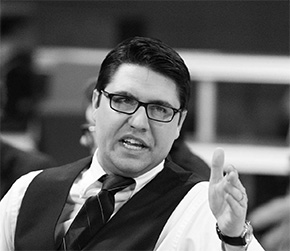What would a Wabash man do if asked to serve on a jury? Would he go along with the crowd on the easiest path to conviction or acquittal? Or would he stand his ground, study the evidence, and stick with the Constitution, which promises the accused innocence until proven guilty beyond a reasonable doubt?
These are fair questions to consider at a time when social media and cancel culture drive a mob mentality not seen since the days of Joseph McCarthy. And it’s in that period – the 1950s – that Reginald Rose’s stunningly difficult play, 12 Angry Men, is set.
 Senior Logan Weilbaker, directing the Wabash Theater production of 12 Angry Men, challenges our community with the intense, character-driven drama. The play, which runs Feb. 26 through March 1 in the Experimental Theater of the Fine Arts Center, reveals each character’s morals, ideals, and convictions as they argue among themselves the innocence or guilt of a teenager accused of murdering his father.
Senior Logan Weilbaker, directing the Wabash Theater production of 12 Angry Men, challenges our community with the intense, character-driven drama. The play, which runs Feb. 26 through March 1 in the Experimental Theater of the Fine Arts Center, reveals each character’s morals, ideals, and convictions as they argue among themselves the innocence or guilt of a teenager accused of murdering his father.
Despite their differences, the members of the jury must be unanimous in their decision. A guilty verdict carries a mandatory sentence to death in the electric chair.
“12 Angry Men is a play about the kind of conflict that occurs when people with different beliefs are forced into conversations that challenge those beliefs,” Weilbaker said. “In my experience, that’s exactly what happens at Wabash. Whether within the confines of a jury room, a small discussion-based class, or the close quarters of the Experimental Theater, it is difficult to come face to face with new ideas. That’s also what the world desperately needs right now: the ability to challenge the ideas we hold dear, especially when it is hard.”
Rose wrote 12 Angry Men as a teleplay in 1954. It was first staged as a theatrical play in 1955, but it took another half-century before it made its way to Broadway. Most people know the 1957 Academy Award-nominated film that was produced by Rose and Henry Fonda, both of whom starred in the motion picture.
The cast comprises Wabash students and alumni (from eight different class years), as well as faculty and staff – men who hail everywhere from Ladoga, Indiana to Surat, India.
Tommy Oppman ’25 plays Juror #8, who casts a lone “not guilty” vote in an early poll of the jury following the murder trial. He proceeds to question every bit of evidence and tries compassionately to persuade his fellow jurors, including Juror #3 – played by Theater Professor Michael Abbott – who fights Oppman at every turn. Though it’s his first foray into theater, Moot Court Champion and pre-law whiz Jake Weber seems right at home in his role as Juror #6.
 Other members of the cast include Clayton Allen ’23 as the Foreman, Cinematographer Andrew Day as Juror #2, Website Editor Adam Phipps ’11 as Juror #4, Eamon Colglazier ’28 as Juror #5, Alex E. Kindig ’26 as Juror #7, IT Services’ Nate Baldwin as Juror #9, Josh Campbell ’25 as Juror #10, Sarvik Chaudhary ’25 as Juror #11, and Alex Schmidt ’27 as Juror #12. Xavier Master ’28 is the Guard and Religion Professor David Blix ’70 is the voice of the judge who presided over the trial.
Other members of the cast include Clayton Allen ’23 as the Foreman, Cinematographer Andrew Day as Juror #2, Website Editor Adam Phipps ’11 as Juror #4, Eamon Colglazier ’28 as Juror #5, Alex E. Kindig ’26 as Juror #7, IT Services’ Nate Baldwin as Juror #9, Josh Campbell ’25 as Juror #10, Sarvik Chaudhary ’25 as Juror #11, and Alex Schmidt ’27 as Juror #12. Xavier Master ’28 is the Guard and Religion Professor David Blix ’70 is the voice of the judge who presided over the trial.
Weilbaker, a theater and classics double major, is a veteran actor on the Wabash stage and has experience directing on and off campus. He knew tackling such a fiercely difficult play in an era of political polarization would be a heavy lift.
“I knew that, if we did it right, this play would be emotionally challenging for the actors, and part of my strategy to combat that was to create a cast with a tight bond,” Weilbaker said.
“Just like a real jury room, everyone in our cast comes to the rehearsal process with their own perspective on life,” Weilbaker added. “The stage is the great equalizer, where there is no professor vs. student, no faculty vs. staff, everyone shares an equal responsibility of bringing the show to life. I like to work very collaboratively, so this model has worked well, eschewing hierarchy and bolstering group participation.”
Weilbaker chose to stage the production in the “black box” experimental theater to create even more intensity and draw the audience closer to the actors. The onstage action takes place in a small room on a hot and humid day. As the deliberation continues, Oppman gradually convinces one other juror that there is a sliver of reasonable doubt. That’s when things really heat up.
“This play, performed in this way, with this group of actors is completely unique,” Weilbaker said. “By staging it in the round, we are also inviting the audience to be part of the story, so each night brings with it the opportunity to create something brand new.
Technical Director David BW Vogel designed the modest set – a long table with 12 chairs around it; a refurbished door from Sparks Center; and a lone window through which a breeze occasionally blows. Bai Rosa (resident Lighting Director) and Brandon Thompson (Costume Designer) are both new to Wabash this year. The costumes are period perfect – all 1950s straight and proper. The cast all got haircuts and shaved their facial hair to fit the parts.
 For Weilbaker, 12 Angry Men marks the end of his time with Wabash theater, and while obviously emotional about this transition in his life, his truly liberal arts path through the theater department and Wabash have left him without regret.
For Weilbaker, 12 Angry Men marks the end of his time with Wabash theater, and while obviously emotional about this transition in his life, his truly liberal arts path through the theater department and Wabash have left him without regret.
“I have directed, acted, written for the stage, and worked behind the scenes in wardrobe, lighting, sound, and in the box office,” said the Fulbright Fellowship finalist. “Having touched nearly every aspect of the production process has made me better at all of them.
“I must also give special mention that it has been especially meaningful to direct Professor Michael Abbott. He directed me in my first show at Wabash and had an enormous impact on my overall experience in so many ways. So, it’s been wonderful to get to collaborate with him one last time.”
Getting the show up and running – and keeping it that way – are Stage Manager Carson Wirtz, Prop Master Xavier Cienfuegos ’27, Assistant Stage Manager Xavier Master ’28, Light Board Operator Julian Castro ’28, and Sound Board Operator Will Rife ’28.
The four-night run is completely sold out, but you can put your name on a short waiting list for free tickets by visiting the Box Office Website.